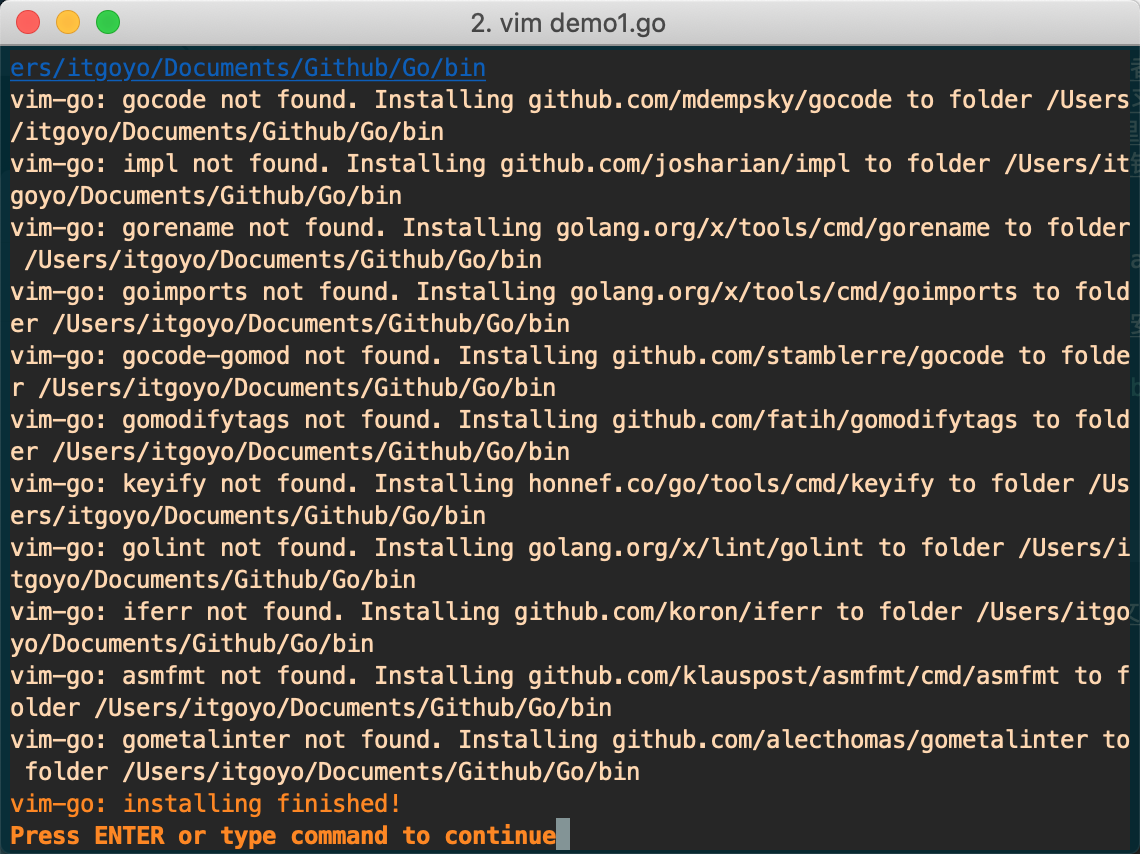Go简单入门
条评论- 1. 项目一 Packages
- 2. 项目二 Imports
- 3. 项目三 Exported names
- 4. 项目四 Functions
- 5. 项目五 Functions continued
- 6. 项目六 Multiple results
- 7. 项目七 Named return values
- 8. 项目八 Variables
- 9. 项目九 Variables with initializers
- 10. 项目十 Short variable declarations
- 11. 项目十一Basic types
- 12. 项目十二 Zero values
- 13. 项目十三 Type conversions
- 14. 项目十四 Type inference
- 15. 项目十五 Constants
- 16. 项目十六 Numeric Constants
- 17. Congratulations!
今天是一次做Go的笔记,一开始直接打开Github上的Go项目然后跑到Wiki位置,然后作者列出了一堆学习Go的资料,这里我
以第一个学习资料https://tour.golang.org/作为Go学习到入门。然后为了训练我的终端运用
能力还有Vim下的编码能力这里我使用到了tmux和Vim编辑器,然后之前已经在VIM里面安装了Vim-go插件了,所以在之前
的Go项目文件目录下可以直接使用命令模式使用:Go来执行相应的操作。如果项目报错都话你可能是没有按照Vim-go的要求现在项目里面执行:GoInstallBinaries.
You will also need to install all the necessary binaries. vim-go makes it easy to install all of them by providing a command, :GoInstallBinaries, which will go get all the required binaries.
但是由于但由于go的代码很多在github和golang.org上,涉及到墙的问题。自动安装可能会失败。当然你有梯子的话除外;我们可以手工安装,进入到GOPATH的SRC目录下,运行命令 git clone https://github.com/golang/tools golang.org/x/tools,再接着上一步:GoInstallBinaries即可
我的解决方式是先让终端邹代理,至于如何让终端走代理呢,无非就是1
2export http_proxy=http://127.0.0.1:12333
export http_proxy=https://127.0.0.1:12333
然后在通过命令打开vim,然后再:GoInstallBinaries,这样子就能下载Go所需要的文件了
最后出现如图所示:

项目一 Packages
1 | package main |
然后在Vim下面执行:Go Run即可输出1
My favorite number is 1
项目二 Imports
1 | package main |
输出1
Now you have 2.6457513110645907 problems.
项目三 Exported names
In Go, a name is exported if it begins with a capital letter. For example, Pizza is an exported name, as is Pi, which is exported from the math package.
pizza and pi do not start with a capital letter, so they are not exported.
When importing a package, you can refer only to its exported names. Any “unexported” names are not accessible from outside the package.
Run the code. Notice the error message.
To fix the error, rename math.pi to math.Pi and try it again.
1 | package main |
输出1
3.141592653589793
项目四 Functions
A function can take zero or more arguments.
In this example, add takes two parameters of type int.
Notice that the type comes after the variable name.
(For more about why types look the way they do, see the article on Go’s declaration syntax.)
1 | package main |
输出1
55
项目五 Functions continued
When two or more consecutive named function parameters share a type, you can omit the type from all but the last.
In this example, we shortened
x int, y int
to
x, y int
1 | package main |
输出1
55
项目六 Multiple results
A function can return any number of results.
The swap function returns two strings.
1 | package main |
输出1
world hello
项目七 Named return values
Go’s return values may be named. If so, they are treated as variables defined at the top of the function.
These names should be used to document the meaning of the return values.
A return statement without arguments returns the named return values. This is known as a “naked” return.
Naked return statements should be used only in short functions, as with the example shown here. They can harm readability in longer functions.
1 | package main |
输出1
7 10
项目八 Variables
The var statement declares a list of variables; as in function argument lists, the type is last.
A var statement can be at package or function level. We see both in this example.
1 | package main |
输出1
0 false false false
项目九 Variables with initializers
A var declaration can include initializers, one per variable.
If an initializer is present, the type can be omitted; the variable will take the type of the initializer.
1 | package main |
输出1
1 2 true false no!
项目十 Short variable declarations
Inside a function, the := short assignment statement can be used in place of a var declaration with implicit type.
Outside a function, every statement begins with a keyword (var, func, and so on) and so the := construct is not available.
1 | package main |
输出1
1 2 3 true false no!
项目十一Basic types
Go’s basic types are
bool
string
int int8 int16 int32 int64
uint uint8 uint16 uint32 uint64 uintptr
byte // alias for uint8
rune // alias for int32
// represents a Unicode code point
float32 float64
complex64 complex128
The example shows variables of several types, and also that variable declarations may be “factored” into blocks, as with import statements.
The int, uint, and uintptr types are usually 32 bits wide on 32-bit systems and 64 bits wide on 64-bit systems. When you need an integer value you should use int unless you have a specific reason to use a sized or unsigned integer type.
1 | package main |
输出1
2
3Type: bool Value: false
Type: uint64 Value: 18446744073709551615
Type: complex128 Value: (2+3i)
项目十二 Zero values
Variables declared without an explicit initial value are given their zero value.
The zero value is:
0for numeric types,falsefor the boolean type, and""(the empty string) for strings.
1 | package main |
输出1
0 0 false ""
项目十三 Type conversions
The expression T(v) converts the value v to the type T.
Some numeric conversions:
var i int = 42
var f float64 = float64(i)
var u uint = uint(f)
Or, put more simply:
i := 42
f := float64(i)
u := uint(f)
Unlike in C, in Go assignment between items of different type requires an explicit conversion. Try removing the float64 or uint conversions in the example and see what happens.
1 | package main |
输出1
3 4 5
项目十四 Type inference
When declaring a variable without specifying an explicit type (either by using the := syntax or var = expression syntax), the variable’s type is inferred from the value on the right hand side.
When the right hand side of the declaration is typed, the new variable is of that same type:
var i int
j := i // j is an int
But when the right hand side contains an untyped numeric constant, the new variable may be an int, float64, or complex128 depending on the precision of the constant:
i := 42 // int
f := 3.142 // float64
g := 0.867 + 0.5i // complex128
Try changing the initial value of v in the example code and observe how its type is affected.
1 | package main |
输出1
v is of type int
项目十五 Constants
Constants are declared like variables, but with the const keyword.
Constants can be character, string, boolean, or numeric values.
Constants cannot be declared using the := syntax.
1 | package main |
输出1
2
3Hello 世界
Happy 3.14 Day
Go rules? true
项目十六 Numeric Constants
Numeric constants are high-precision values.
An untyped constant takes the type needed by its context.
Try printing needInt(Big) too.
(An int can store at maximum a 64-bit integer, and sometimes less.)
1 | package main |
输出1
2
321
0.2
1.2676506002282295e+29
Congratulations!
You finished this lesson!
You can go back to the list of modules to find what to learn next, or continue with the next lesson
发现更多更好玩的,欢迎关注我的微信公众号: FullStacker
